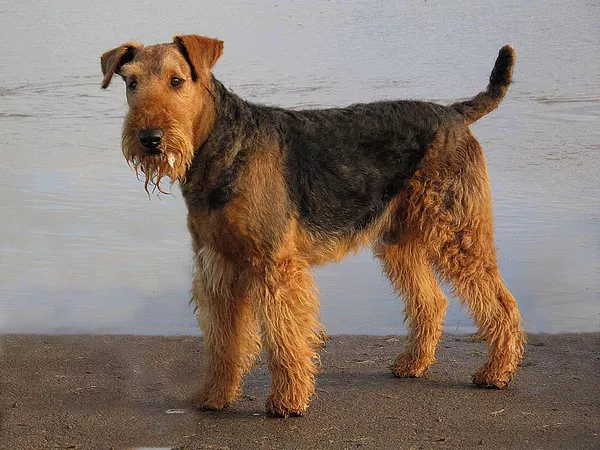Bringing home an Airedale Terrier puppy is an exciting adventure. These intelligent and energetic pups make wonderful companions, but they do require proper training to grow into well-behaved adults. In this comprehensive guide, we will walk you through the process of training your Airedale Terrier puppy, from basic commands to socialization and behavior management. Whether you’re a first-time puppy parent or an experienced dog owner, this article will equip you with the knowledge and skills needed to raise a happy and well-trained Airedale Terrier.
Understanding the Airedale Terrier Breed
Before we dive into training, it’s essential to have a basic understanding of the Airedale Terrier breed:
1. Intelligent and Energetic: Airedales are known for their intelligence and boundless energy. They thrive on mental and physical stimulation.
2. Independent Thinkers: Airedales can be independent thinkers, which means they may challenge your commands at times.
3. Affectionate and Loyal: They are incredibly loyal to their families and can be very affectionate.
4. Territorial Instincts: Airedales have a natural territorial instinct, which can make them excellent watchdogs.
Training Your Airedale Terrier Puppy
Now, let’s delve into the training process:
1. Socialization is Key
Early socialization is crucial for Airedale Terrier puppies. Expose them to various people, pets, environments, and situations to build their confidence and prevent behavioral issues later on.
2. Basic Obedience Commands
Begin with basic commands like “sit,” “stay,” “come,” and “down.” Use positive reinforcement techniques such as treats and praise to reward good behavior.
3. Consistency and Patience
Airedales respond well to consistent training routines. Be patient and practice commands daily in short, positive sessions.
4. Leash Training
Teach your puppy to walk on a leash without pulling. Reward them for walking calmly beside you.
5. Crate Training
Crate training can help with housebreaking and provide a safe space for your puppy. Make the crate a positive place with toys and treats.
6. Housetraining
Establish a regular potty schedule and take your puppy outside after meals and naps. Praise and reward them when they do their business outdoors.
7. Addressing Behavioral Challenges
If your Airedale Terrier puppy exhibits unwanted behaviors like digging or chewing, redirect them to appropriate toys and use positive reinforcement to discourage unwanted habits.
8. Advanced Training
Consider enrolling in obedience classes to continue your puppy’s training and socialization with other dogs.
9. Exercise and Mental Stimulation
Provide ample physical exercise and mental stimulation to prevent boredom, which can lead to destructive behaviors.
10. Positive Reinforcement
Always use positive reinforcement techniques, like treats, praise, and affection, to reward good behavior. Avoid harsh punishments, as they can be counterproductive.
Conclusion
Training your Airedale Terrier puppy is a rewarding journey that strengthens your bond and sets the foundation for a well-behaved adult dog. With patience, consistency, and positive reinforcement, you can ensure that your Airedale Terrier puppy grows into a confident, well-mannered, and happy companion.
FAQs about Airedale Terrier puppies:
Q1: What is an Airedale Terrier puppy like in terms of temperament?
A1: Airedale Terrier puppies are known for their energetic, intelligent, and confident personalities. They are typically affectionate and loyal to their families but can be independent thinkers.
Q2: How big do Airedale Terrier puppies get when fully grown?
A2: Airedale Terriers are a medium to large breed. Adult males typically weigh between 55 to 65 pounds (25 to 29 kg), and adult females weigh around 40 to 55 pounds (18 to 25 kg).
Q3: Are Airedale Terrier puppies good with children and other pets?
A3: Airedale Terriers can be good with children and other pets if they are socialized early. However, their playfulness and energy should be supervised around smaller animals and very young children.
Q4: Do Airedale Terrier puppies require a lot of exercise?
A4: Yes, Airedale Terrier puppies are active and require regular exercise to burn off their energy. Daily walks and playtime are essential to keep them happy and healthy.
Q5: What is the grooming routine for Airedale Terrier puppies?
A5: Airedale Terrier puppies have a wiry, non-shedding coat that requires regular grooming. This includes brushing, hand-stripping, and occasional visits to a professional groomer.
Q6: How can I house train my Airedale Terrier puppy?
A6: House training involves establishing a regular potty schedule, taking your puppy outside after meals and naps, and using positive reinforcement with praise and treats when they eliminate outdoors.
Q7: Are Airedale Terrier puppies easy to train?
A7: Airedale Terriers are intelligent but can be independent. Consistent, positive reinforcement training methods work best. Early socialization is also important to ensure they grow up well-adjusted.
Q8: What are common health concerns for Airedale Terrier puppies?
A8: Common health issues for Airedale Terrier puppies can include hip dysplasia, skin problems, and certain genetic conditions. Regular veterinary check-ups are essential for their well-being.
Q9: How long do Airedale Terrier puppies stay puppies?
A9: Airedale Terrier puppies typically reach their full adult size and behavior maturity by around 12 to 18 months of age.
Q10: Do Airedale Terrier puppies have a strong prey drive?
A10: Yes, Airedale Terriers have a strong prey drive, which means they may be inclined to chase smaller animals. Proper training and socialization can help manage this instinct.
Q11: Can Airedale Terrier puppies live in apartments?
A11: Airedale Terriers can adapt to apartment living, but they need regular exercise and mental stimulation. Access to a secure outdoor area for play is beneficial.
Q12: How can I choose a reputable breeder for an Airedale Terrier puppy?
A12: Look for breeders who prioritize the health and well-being of their puppies, provide health clearances for parent dogs, and offer socialization and early training for their puppies. Avoid puppy mills and backyard breeders.


